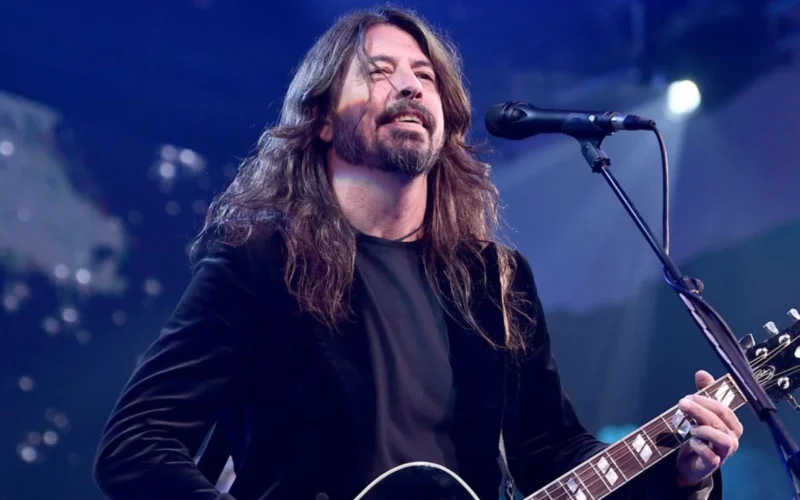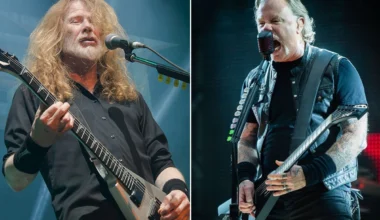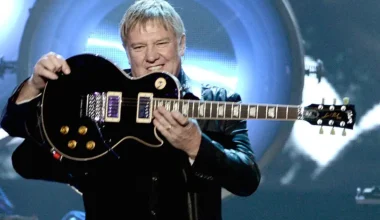In the history of rock, Nirvana’s time in the spotlight was pretty brief. But there’s little doubt the impact they made while together. While recently speaking on the Conan O’Brien Needs a Friend podcast, Dave Grohl reflected on the band’s legacy and what he feels is the “coolest thing” about it now three decades removed from the height of their fame.
“I refer to my children a lot because they’re discovering music, well differently than we did then, but emotionally in the same way that we did at their age. And to see their reaction to this music now is really fucking cool,” explained Grohl to O’Brien.
The Nirvana drummer then recalled a moment with his daughter Violet where he asked her if she wanted to sing a Nirvana song at a charity benefit. “At the time she was maybe 14, maybe 15, and I said, ‘You want to sing on a Nirvana song’ and she was like, ‘Absolutely.’ And I said, ‘Which one?’ And not just this record, but all of them, but she picks ‘Heart-Shaped Box.’ And my first reaction was, ‘What have I done to my kid to fuck them up so much that they want to sing that?,’” laughs Grohl. “But seriously, I was very proud.”
But his daughter isn’t the only one from her generation to embrace Nirvana. As Grohl explains, “What I’ve realized is that kids these days, there’s like a window between the ages of 10 and 13 or maybe 11 and 14, where almost every kid goes through a Nirvana phase. It’s for a reason. And I think it has less to do with a sound and I think it has more to do with what it means. Because I think it means the same thing today to those kids that it meant when we released it. That to me is the coolest thing.”
Elsewhere in the interview, Grohl recalls another instance of his other daughter Harper asking about Nirvana. “My kids will sometimes ask me [about Kurt],” says Grohl. “My daughter Harper and I were driving one day in the car not long ago, six months ago, and a Nirvana song came on. We don’t listen to Nirvana at home, but this Nirvana song comes on and she’s singing along to the lyrics and I’m thinking, ‘Wow, that’s weird, I’ve never heard her listen to a Nirvana song before.’ How does she know a Nirvana song?”
“She says, ‘Dad, how old were you when you made this song?’ I said, ‘God, I think I was 22 maybe.’ And she goes, ‘Oh, how old was Kurt?’ And I said, ‘I guess he was like 23 or 24.’ And she said, ‘What was he like?’ And I said, ‘He was really nice. He was kind of shy, sometimes quiet, but he was cool.’ And she asked, ‘Well, he was shy. Was he shy around people that he knew or people that he didn’t know?’ And I said, ‘Kind of a little bit of both.’ And she said, ‘God that’s so strange that someone who feels shy like that would write these songs and sing them and then stand onstage in front of 100,000 people and play them.’ I thought that was so cool, cause I think she wasn’t looking at so much that other thing, she was looking at the person.”
Having been through losing Cobain in the way that he did, Grohl says, “After Nirvana, that curtain sort of got pulled away, and it changed the way I thought about every other mythological rock star that I’d ever followed in my entire life. It made me think, ‘Oh shit, they were an actual human being.’ We look at them like they’re playing cards or something like that.”
NIrvana’s legacy is back in the spotlight with the 30th anniversary deluxe reissue of the band’s In Utero album recently arriving. The band’s third studio album was the follow-up to Nevermind, yielding such standout tracks as “Heart-Shape Box,” “Rape Me,” “All Apologies,” “Scentless Apprentice,” “Serve the Servants” and more.





